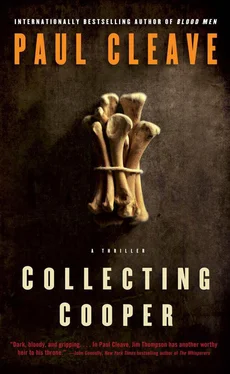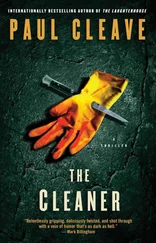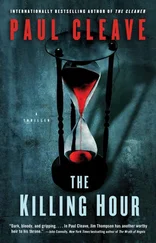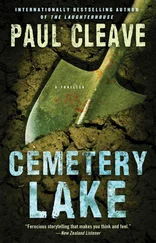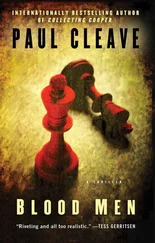Paul Cleave - Collecting Cooper
Здесь есть возможность читать онлайн «Paul Cleave - Collecting Cooper» весь текст электронной книги совершенно бесплатно (целиком полную версию без сокращений). В некоторых случаях можно слушать аудио, скачать через торрент в формате fb2 и присутствует краткое содержание. Год выпуска: 2011, ISBN: 2011, Издательство: Atria Books, Жанр: Триллер, на английском языке. Описание произведения, (предисловие) а так же отзывы посетителей доступны на портале библиотеки ЛибКат.
- Название:Collecting Cooper
- Автор:
- Издательство:Atria Books
- Жанр:
- Год:2011
- ISBN:9781439189627
- Рейтинг книги:3 / 5. Голосов: 1
-
Избранное:Добавить в избранное
- Отзывы:
-
Ваша оценка:
- 60
- 1
- 2
- 3
- 4
- 5
Collecting Cooper: краткое содержание, описание и аннотация
Предлагаем к чтению аннотацию, описание, краткое содержание или предисловие (зависит от того, что написал сам автор книги «Collecting Cooper»). Если вы не нашли необходимую информацию о книге — напишите в комментариях, мы постараемся отыскать её.
Collecting Cooper — читать онлайн бесплатно полную книгу (весь текст) целиком
Ниже представлен текст книги, разбитый по страницам. Система сохранения места последней прочитанной страницы, позволяет с удобством читать онлайн бесплатно книгу «Collecting Cooper», без необходимости каждый раз заново искать на чём Вы остановились. Поставьте закладку, и сможете в любой момент перейти на страницу, на которой закончили чтение.
Интервал:
Закладка:
“I didn’t mean it like that,” I tell him.
“Yes you did,” he says, and he’s right.
“I need another copy of the file.”
“I’ll think about it,” he says. “So now what, now you’re thinking maybe Natalie Flowers is the one who broke in and stole it and killed your cat?”
“The thought had crossed my mind.”
“Listen, there’s been an update. We’ve found the car that hit the dumpster behind the café.”
“When?”
“A few hours ago.”
“And you’re only letting me know now?”
“I’m sorry, boss, you’re right-you should have been the first person I told. Jesus, Tate.”
“Okay, point taken,” I say.
“Yeah, I’m sure you’ll remember it. Anyway, we sent out the details to all the panel beaters in the city yesterday. We figured it was a long shot. I mean, it’s not like somebody is going to abduct a girl and have his car looked at two days later, but we did it because it’s procedure, and because it might not have come from the car that took Emma. One of them called us this morning saying he had a match to the color, and metal transfer from what could have been the dumpster, and the damage matched the height of the paint on the dumpster. So we checked it out, and sure enough, it was our car.”
“And?”
“And a couple of detectives go around and speak to the owner. He’s seventy-six-year-old Arnold Sweetman and they can tell right off the bat that he’s got nothing to do with Emma’s disappearance. He goes into the café at least once a week. He says he was sitting in his car getting ready to leave when a girl tried to steal his wallet. They show him a picture of Emma Green, and he tells them that’s the girl.”
“What?”
“That’s what he said. He said he was sitting there when she opened up the door, leaned in, and tried to take his wallet from his pocket.”
“Are you serious?”
“I know. It doesn’t make sense. So the detectives take him down to the station and keep on questioning him. His answer doesn’t change. He really thinks Emma Green was trying to mug him. So we check the side of his car for prints, and sure enough, we find a couple on the handle that belong to her.”
“There must have been a reason she was opening it,” I say. “I mean, she just isn’t going to walk up to a car with somebody sitting in it, open the door, and try to mug them, especially right behind her work where people could recognize her.”
“There is a reason,” Schroder says. “After an hour, Sweetman asks for a lawyer, so the detectives have to leave him alone. His lawyer shows up, and when they go into the interview room Sweetman has fallen asleep, only he looks like he could be dead. So the lawyer puts his hand on Sweetman’s shoulder and slowly tries to shake him awake, and when he comes to he starts screaming at his lawyer accusing him of trying to molest him. It only lasts five seconds, but it’s possible the same thing happened the other night. The café owner remembers Sweetman being in there, and remembers him leaving at least an hour before Emma left. He probably went and sat in his car and fell asleep, and Emma came along and saw him and was concerned. She probably opened the door and he reacted the same way he did with his lawyer.”
“And then Sweetman sped away,” I say, finishing the story, “and Emma was either abducted from the parking lot, or somewhere between there and her home by Cooper Riley.”
“That’s how it’s looking. But none of it gets us any closer to finding where she is now,” he says, and hangs up.
I’m thirty pages into Cooper’s manuscript when a patrol car and a station wagon pull up outside. I return the gun to its hiding place beneath the mattress. Three men come to the door and none of them is Schroder. Two of them are officers and the other the crime scene technician. I lead them through to Daxter. One of the officers looks away and the other one groans. The crime scene technician stares at my cat as though he were a puzzle. The wire that was around his neck is still there. It’s an unwound coat hanger. One end is wrapped around Dax’s neck, the other hooked over the edge of the gutter on the roof. I show them the grave.
“Jesus, this is sick,” one of the officers remarks.
I agree with him. The two officers take a customary look around the backyard. I tell them about the break-in. They keep glancing at each other as if confirming a suspicion they had about me earlier, or out of an attraction for each other. One of them heads out to the street while the other goes through the house for a few minutes before joining him in canvassing the neighborhood, leaving me with the forensics guy. His name is Brody and I’ve worked with him before but he seems to have wiped any memory of that from his system. His forearms are red from the sun and his nose is peeling and he has a palm-sized bald spot that’s burning and he keeps sniffing, maybe an allergy to the cat. He goes about ignoring me, spending some time inside then coming back out, taking plaster casts of the footprints before dusting the shovel for prints.
“There’s a couple of sets on here,” he says, “we’ll need to compare them against yours.”
“Probably against my parents too,” I say. “They’ve been looking after the garden for me.”
“Well, there’s a few sets there, hopefully we can find a match. See there?” he says, pointing to the base of the fence. “That’s dirt transfer. Your cat killer left that way, and I’d guess he arrived that way too. I’d say he watched you burying the cat and drove around the block to your front door. There’s plenty of shoe prints too, which we’ll try to match up, but there’ll be a thousand identical shoes. There’s enough wear and tear in them that if you bring me something I can match it.”
“What else?”
“We’ve got prints inside. We got them over the computer desk. They might all end up being yours, but we’ll run them. We might get lucky. Between the study and the shovel, we might get a hit if this guy has a record.”
“Nothing,” one of the officers says, coming back through the house. “We’ve gone right up and down the street-nobody saw anything.”
“Yeah, that sounds about right,” I say. Other than the stoned guy who lived opposite Cooper Riley, the last time somebody in this country actually admitted witnessing a crime was around 1950.
“We’ll run the prints and get the cat autopsied. You should fill the hole back in and stay awake tonight in case he comes back,” Brody says.
They pack everything up. Daxter is slipped into a dark black bag made from thick plastic. I follow them out to the street.
“I want him back when you’re done,” I say, nodding toward the bag.
“I’ll make sure of it,” Brody says.
I make sure the doors are locked. I retrieve the gun. My knee is getting sore again. I refill the grave. I get a strong sense of déjà vu. I hold out hope the fingerprints will get a match. If it is somebody from Grover Hills they might have been sentenced there after committing a crime. We could have a name within an hour. We could have Emma Green by the end of the day. Or they might match Melissa’s fingerprints, which are on record from surfaces she touched when she murdered Detective Calhoun. If they do belong to her, how did she know I was working on the case? Only Schroder knew. No, it can’t have been her.
I sit in the shade and read another chunk of Cooper’s manuscript. I’ve read similar things before, written by profilers from the UK or the US, and I imagine this is what Cooper was attempting to do. Cooper’s one reads like a textbook. There is no flair, no emotion in those words, not like other books I’ve read where the author is genuinely disgusted and upset about the cases they’re writing about, the kind of author who you think was crying into his keyboard as he detailed each victim he had to look at. Some of the names in here I remember from when I was on the force, there’s even one that I arrested, a man by the name of Jesse Cart-man who raped and killed and digested parts of his sister-and not in that order. Cooper attempts to explain the criminal mind. He tries to get inside their heads. It works when police profilers do it, because they’re dealing with people who for the most part are sane. Many of the people locked away at Grover Hills and the other institutions Cooper visited were purely delusional, which skews all of Cooper’s data. He’s not studying a criminal mind, he’s studying one where two and two equal nineteen. He struggles to draw connections from one patient to the next. Some have bad backgrounds, some come from good homes, some are making stuff up. He will make one point and then a chapter later he will contradict it. This could explain why the book is still in manuscript form and not for sale in bookshops. Or he stopped trying. The version I got from the university hadn’t been touched in three years. Did Cooper give up writing after he was attacked?
Читать дальшеИнтервал:
Закладка:
Похожие книги на «Collecting Cooper»
Представляем Вашему вниманию похожие книги на «Collecting Cooper» списком для выбора. Мы отобрали схожую по названию и смыслу литературу в надежде предоставить читателям больше вариантов отыскать новые, интересные, ещё непрочитанные произведения.
Обсуждение, отзывы о книге «Collecting Cooper» и просто собственные мнения читателей. Оставьте ваши комментарии, напишите, что Вы думаете о произведении, его смысле или главных героях. Укажите что конкретно понравилось, а что нет, и почему Вы так считаете.
